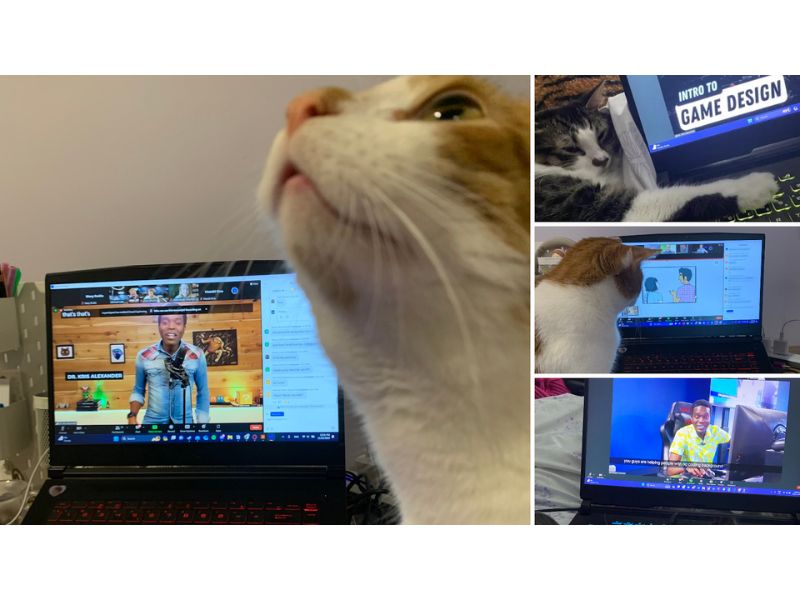Over 300 TMU students wrap up The Creative School’s Intro to Game Design course
Students enrolled in Dr. Kris Alexander's Intro to Game Design course at The Creative School are learning the difference between playing and creating - from dissecting games to hearing from unique guest speakers. Over 300 students enrolled in this course from across many disciplines across Toronto Metropolitan University, including over 32 different disciplines, explored how video games influence culture, community, and creativity. In this course, the boundaries between digital narratives and reality blur as students engage in thought-provoking assignments and discussions that challenge traditional viewpoints in a live virtual simulation (external link) learning environment.
Beyond distraction: Game design as a learning catalyst
When focusing on the elements of video games that extend beyond playing, the opportunities that come with learning video game design are endless.
Spanning across disciplines such as medicine, engineering and finance, video games, in an academic context, serve as a dual-purpose conduit to facilitate learning and educate individuals through critical thinking. From his recent TED Talk, Dr. Alexander noted:
“Video games, by design, are a complex blend of audio, text, video and interactivity that can intensify focus,” said Dr. Alexander. “And because of their enjoyment factor, these components of video games can help with something our students desperately need in the classroom: motivation.”
To combat the negative stereotypes surrounding gaming, Dr. Alexander uses the term "Pixels with Purpose." Games are not always mindless distractions; the tiny pixels on screens can be the agents of change in our digital world, telling diverse stories and leaving a tangible impact.
Students stumble upon knowledge in unexpected, unscripted moments. This spontaneous learning mirrors the real-world chaos and unpredictability, preparing students to navigate the twists and turns of life with ease.
“I am not just teaching game design,” Dr. Alexander adds. “I'm also using the mechanics of video games to trick students into learning effective storytelling, user engagement, and even graphic design, exploring complex concepts like history, sexism, racism, corporate culture and tokenism.”
Dr. Alexander’s research focuses on how video game design provides a model for developing active engagement within higher education. By incorporating game mechanics, educators can harness the inherently engaging and motivating nature of games to create proactive student learning.

Cats Watching Game Design Class (Kriscord Community)
Left: Photo by maryohmy (Kriscord), Top Right: Earlgr3y (Kriscord), Middle Right: maryohmy, Right bottom: Earlgr3y
An invitation to level up: Video Game Design 101
“What is your superpower?”A question Dr. Alexander often asks his students or anyone interested in gaming. It’s not a trick question; there is really no wrong answer. No matter what your superpower is or which TMU program you are coming from, there is a place for you when it comes to making video games.”
Many of the students in Intro to Game Design come from nursing, engineering, business, computer science and other programs apart from The Creative School.
“All of my classes are not mandatory, and many students from across the university choose to enroll - this is an important thing to note because students are motivated, AND this class is completely online,” Dr. Alexander added. “We've jumped from 80 students to over 300 this year. Students are voluntarily taking our classes because of the link between theory practice and practicality - In addition to a relation to their specific discipline. ”
Creating an engaging video game requires more than technical skills. Students start the course by studying the psychology behind persuasion, narratives and character-building. Without a strong foundation of storytelling, technical skills cannot effectively engage an audience.
Consequently, many students draw from their own life experiences to explore topics and themes they are passionate about, educating others through captivating journeys tackling immigration, minority experiences, Indigenous wisdom, and much more.
An innovative classroom calls for innovative participation. Intro to Game Design puts the human experience at the center of learning. From spinning a wheel to picking a student to playing a game live, to ‘Kriscord’: a discord channel where all students Dr. Alexander has ever taught to stick together as a community to discuss game design and the ever-evolving industry.
“We've built a community of over 800 members in the last 4 years,” he shares.
A doorway to other worlds and many opportunities
As the video game and virtual production industries grow, the market demand for individuals with the skills related to video game design is increasing. Game design and virtual production now have a place in various fields like film, engineering, medicine and more.
“I think there's a knack to building a good game as much as there is a knack to crafting a balance between academic theory, engagement, and practicality,” Dr. Alexander adds.
Studying game design in an academic setting enables students to engage with the discipline holistically.
“The components that companies like Gameloft need to see on your resume to hire are literally in the outlines for our course and subsequent courses. Our students are the ones they're looking for,” Dr. Alexander said.
After Intro to Game Design, students realize that game design is built on purpose, audience and most importantly passion. Make each design choice count!

The Creative School at Toronto Metropolitan University
The Creative School is a dynamic faculty that is making a difference in new, unexplored ways. Made up of Canada’s top professional schools and transdisciplinary hubs in media, communication, design and cultural industries, The Creative School offers students an unparalleled global experience in the heart of downtown Toronto.
